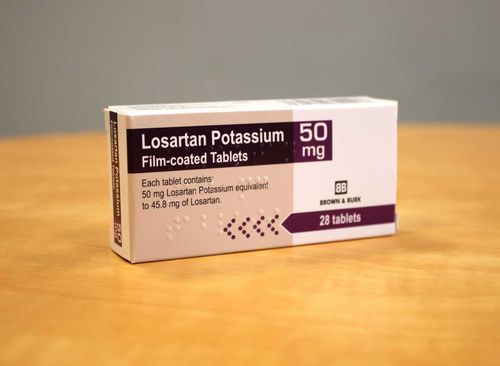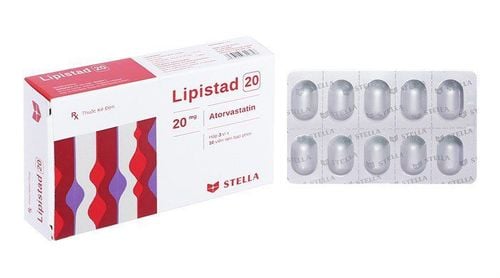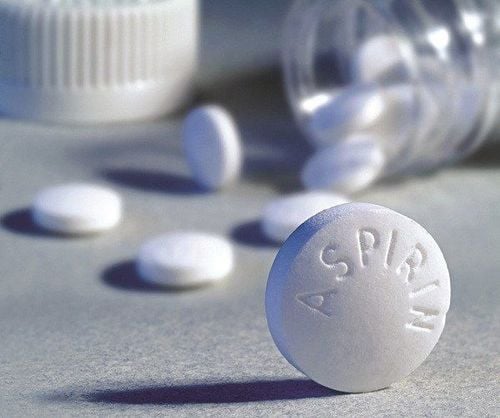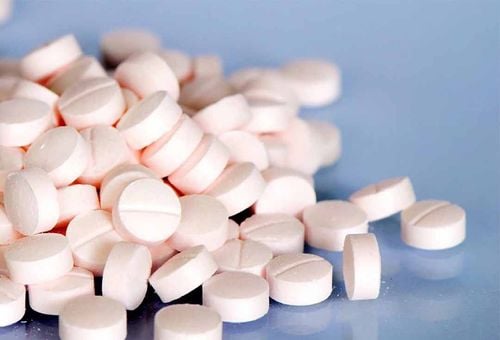This is an automatically translated article.
Lipotatin 20mg is a medicine prescribed by doctors to lower cholesterol in people who have been diagnosed with high cholesterol. However, the drug also has some dangerous side effects that patients need to be aware of when using.
1. What is Lipotatin 20mg?
Lipotatin 20mg is a medicine used to lower the level of "bad" cholesterol in the blood (low-density lipoprotein, or LDL), increase the level of "good" cholesterol (high-density lipoprotein, or HDL), and reduce triglycerides It treats symptoms of high cholesterol (hyperlipidemia), thereby reducing the risk of stroke, heart attack or other heart complications. Lipitor may be used alone or with other medications.Ingredients of the drug: Atorvastatin 20mg.
Dosage form: tablets.
2. What is Lipotatin 20mg used for?
Lipotatin 20mg is used to treat high cholesterol. Preventing serious cardiovascular events such as heart attack and stroke in adults. The drug is also approved to reduce the risk of angina and the need for heart surgery in people at high risk. People are considered high risk if they have multiple cardiovascular risk factors, such as: Smoking or tobacco use; High blood pressure (hypertension); Being male; Over 65 years old; Low levels of high-density lipoprotein (HDL) in the blood, often referred to as “good” cholesterol. Drugs that reduce the risk of serious cardiovascular events in adults with heart disease, such as coronary artery disease, peripheral vascular disease (narrowing of blood vessels), a history of stroke, or flow problems other blood. Improve cholesterol levels in adults with conditions that cause high cholesterol levels, including: Primary hyperlipidemia: High levels of low-density lipoprotein (LDL), commonly known as “bad” cholesterol, in the blood; Hypertriglyceridemia: High levels of triglycerides, another type of lipid, in the blood; Mixed dyslipidemia: Low HDL levels with high levels of LDL and triglycerides in the blood; Homozygous familial hypercholesterolemia: An inherited condition that can cause very high LDL levels.
3. What are the side effects of the drug?
More common side effects of Lipitor may include:
Common cold symptoms such as sore throat or sneezing; Athritis; Diarrhea ; Pain in the arms, legs, hands, or feet; Urinary tract infections . Serious side effects and their symptoms may include:
Muscle discomfort: Pain, weakness, spasms or stiffness; Rhabdomyolysis: A rare but life-threatening condition in which the muscles break down and can lead to kidney failure, severe muscle pain or weakness, nausea or vomiting, dark urine, dizziness, heart palpitations, feeling exhausted or confused; Liver damage: Signs include fatigue, nausea or vomiting, dark urine and jaundice, and yellowing of your skin or the whites of your eyes; blood tests showing elevated liver enzyme levels could also be a signs of liver damage; Memory problems; Allergic reactions: Swelling of the tongue, lips and face or difficulty breathing. The following long-term side effects have been reported following treatment with Lipotatin:
Diabetes: An increase in blood sugar has been reported with the use of statins, including Lipotatin. Elevated blood sugar can increase your risk of diabetes or make it worse; Necrotizing myopathy: This is a rare but serious condition in which the immune system attacks muscle tissue and causes damage. Muscle weakness can be a lingering symptom of this condition. Blood test results may continue to show increased creatine kinase levels after treatment is stopped.
4. Dosage and usage
Dosage in hyperlipidemia and dyslipidemia:
The recommended starting dose of the drug is 10 or 20 mg once daily. Patients who require a large reduction in LDL-C (more than 45%) can be started with 40 mg once daily. The dosage range of the drug is 10 to 80 mg once daily. Lipotatin 20mg can be taken as a single dose at any time of the day, with or without food. The initial and maintenance doses of Lipotatin should be individualized according to patient characteristics such as treatment goals and response. After initiation or when titration of Lipotatin, lipid levels should be analyzed within 2 to 4 weeks and dosage adjusted accordingly. Heterozygous familial hypercholesterolemia in pediatric patients 10 to 17 years of age:
The recommended starting dose of Lipotatin is 10 mg/day; The usual dose range is 10 to 20 mg orally once daily. Dosage should be individualized according to the recommended goal of therapy. Adjustments should be made over a period of 4 weeks or more. Homozygous Familial Hypercholesterolemia:
Dosage of Lipotatin in HoFH patients is 10 to 80 mg daily. Lipotatin should be used as an adjunct to other lipid-lowering treatments (eg, lowering LDL) in these patients or if such treatments are not available.
5. Lipotatin may interact with other drugs
Lipotatin oral tablet may interact with other drugs, vitamins or herbs you are taking. To avoid interactions, tell your doctor about all medications, vitamins, or herbs you are taking.
Drugs that can cause interactions with Lipotatin are listed below:
Antibiotics: Clarithromycin, Erythromycin; Fungicides: Itraconazole, Ketoconazole; Cholesterol-lowering drugs: Gemfibrozil, fibrates, Niacin, Rifampin HIV drugs: Darunavir, Fosamprenavir, Lopinavir Digoxin Pills Oral contraceptives
6. Some notes when taking Lipotatin 20mg
Caution:
Lipitor may react adversely with erythromycin, especially in elderly patients. Increased blood sugar and glycosylated hemoglobin (HbA1c) levels have been reported with oral administration of statins such as Lipotatin. Use with caution with Lipitor in the elderly; risk of myopathy. Heavy alcohol use, kidney failure, history of liver disease or liver problems. Fatal liver failure and non-steatosis have been reported (rare). Risk of rhabdomyolysis (breakdown of muscle tissue). Myopathy Risk: Increased with concomitant use of Fibrate, Niacin, Cyclosporin, Macrolid, Telaprevir, Boceprevir, combination HIV protease inhibitors (eg, saquinavir plus ritonavir, lopinavir plus ritonavir, tipranavir plus ritonavir, darurenavir plus ritona plus ritonavir) or the antifungal drug Azole. Discontinue or discontinue medical treatment with this medicine in any patient who is developing myopathy, kidney failure, or greater transaminase levels. In people with liver failure, people with poor liver health, and people who have recently had a stroke. CYP3A4 substrates; avoid grapefruit products and be cautious with other CYP3A4 inhibitors. Secondary causes of high cholesterol should be ruled out before starting this medication. Pregnancy and breast-feeding:
Do not use this medicine if you are pregnant. The health risks associated with this drug outweigh the potential benefits. Your doctor will inform you about safer alternatives. Because of the potential for adverse reactions and side effects that could affect the health of a nursing infant, women taking atorvastatin should not breast-feed. This drug is contraindicated in nursing mothers as it may be excreted in breast milk. Above are the uses and dosage of Lipotatin 20mg. Patients need to carefully read the instructions for use, consult a doctor / pharmacist before using to ensure safety and maximize the effectiveness of treatment.
Please dial HOTLINE for more information or register for an appointment HERE. Download MyVinmec app to make appointments faster and to manage your bookings easily.













